rest in peace, david lynch
i can't cope with watching our greatest generation of filmmakers fade one by one
“I like to remember things my own way. How I remembered them, not necessarily the way they happened.” — David Lynch
The first time I ever turned on Twin Peaks, it was a melancholy Friday night circa 2015—one I was spending alone again because my friends were off without me. The basement TV screen glowed in my face, showing all the options the On Demand catalog had to offer. With tear streaked cheeks and a left-out, self-pitying attitude, I purchased (under the nose of my parents, of which I got a scolding for later when the bank statement came in the mail) the first season of the elusive mystery.
There had not been a day where I did not use Tumblr, and also not a day where on Tumblr I could avoid Twin Peaks. Gifs of Laura Palmer, stills of the Black Lodge, clips of Agent Cooper with his ever-present cup of coffee, quotes with dark undertones, so many aspects of this show pulled to be placed on my grid ~aesthetically~ and I could no longer deny that I needed to be in on the action. It was like Lynch’s world was reaching out to me through the pixels, beckoning me to dive in.
The slow, ethereal, and slightly haunting theme took over the screen, muted neutrals of an industrial town dancing in my eyes. The opening credits washed over me, accompanied by Angelo Badalamenti’s unforgettable score, setting the tone for the unusual journey I was about to set out on.
From that moment, the Lynchian fascination spiraled.
I sought out Eraserhead immediately learning this was Lynch, having also seen aesthetically pleasing stills on my Tumblr feed. The stark black-and-white imagery, the enigmatic expressions, the overall surreal aura were impossible to ignore. I trudged up to the Family Video (may she rest in peace, too) down the street and scoured the aisles for it. Someone had rented it out, much to my dismay, so I then returned to the Family Video every night until it was brought back and I could have it for myself. I got it after six or seven painstaking nights of watching, waiting to stake my claim.
I popped the DVD into the slot of my Macbook Pro—back when slots were still a thing and the computer was literally three inches thick and fifteen pounds—waiting with baited breath and excitement. The whirring sound of the disc spinning echoed in my quiet room as I adjusted the screen, dimmed the lights, and prepared for whatever Lynchian dreamscape awaited me. As the opening scene started, I felt as though I was being tugged into another dimension, one where the mundane and the malformed coexisted in a fragile balance.
It’s history from there, Mulholland Drive, Blue Velvet, Inland Empire, I couldn’t get enough of his eccentricity. His unique way of storytelling that I had never been witness to before. It changed my life, changed the way I consume and view art, how I analyze it, and it’s all owed to him.
The loss of David Lynch will be felt profoundly, not just because of the strange and beautiful worlds he created, but because of what his passing signifies in the broader landscape of film and art. Lynch was an auteur in the truest sense—a singular force of vision and creativity who managed to carve out his own corner in a world increasingly hostile to such differences. In an age where studios and production companies rarely give artists like him a chance anymore, Lynch will stand as a reminder of what could be accomplished when an artist is allowed to fully embrace their own peculiar genius, and I’m terrified we’ll never get to see that again from younger folks.
We are witnessing the gradual fading of the greatest generation of directors, the last true auteurs who operated in a way that, while not always completely understandable, at least allowed for the possibility of transcendence. These are filmmakers who didn’t just make movies; they created experiences, conjured entire universes that bent the rules of storytelling and visual narrative. Lynch was among the few—Waters, Scorsese, Coppola, Herzog, Cronenberg—who took the banal and made it sublime, who found the terrifying within the everyday and gave it a voice.
I think the companies that wouldn’t fund Lynch’s projects towards the end are despicable, trying to shove him into the corner of obscurity, as though his work was no longer relevant in an industry obsessed with the next big franchise or formulaic blockbuster. Lynch, with his unapologetically unique vision, was increasingly marginalized by a system that didn’t understand or appreciate the kind of art he made.
This treatment is all the more enraging when we remember that Lynch wasn’t alone in facing this. Directors like John Waters, another creator with a fiercely individualistic style, have similarly been pushed to the side, despite their legacies. Waters, known for his subversive and often shocking films, encountered resistance from studios unwilling to back projects that didn’t conform to marketable templates—like his newest opus, Liarmouth. The sidelining of such visionary artists is a loss for everyone, it stifles the daring voices that make cinema a truly amazing medium.
The passing of directors like Lynch marks the end of an era, one where art could still be weird and challenging, and where the creative process wasn’t always dictated by algorithms and market research. As these visionaries age and eventually leave us, we are left wondering who will take their place? Who will challenge us, provoke us, and lead us into the depths of our own subconscious the way Lynch could? The answer isn’t clear, and perhaps that’s what makes his loss so difficult to take.
Lynch’s work wasn’t just entertainment; it was a challenge to see the world differently, to view the darkness and the strangeness within and without. He stood apart, a true iconoclast, and now we are left with the daunting task of moving forward without that guiding, unsettling light.
He was a sentimentalist at heart, something that often got overlooked beneath the layers of surrealism and darkness in his works. Despite his films’ often nightmarish landscapes, there was always an undercurrent of deep empathy, a longing to connect with the fragile, fleeting beauty of the human experience.
Over COVID, he would grace us with comfort and a sense of normalcy through his daily weather reports and his “What is David Working On?” videos. A man standing in front of a camera—instead of behind it—giving the weather forecast from Los Angeles became a daily ritual for many (including me), a reminder that even in chaos, there are constants. It was his way of reaching out, providing a slice of his world to others.
Lynch’s creative output extended beyond film and television, too, into music, photography, painting, and even furniture design. His polymathic approach to art was unlike any other in the industry, he is a true individual. He created entire worlds not just on screen, but in soundscapes, visual art, and physical spaces that were all still distinctly Lynchian. He had a look, a feel, a vibe, running with it until the wheels fell off, and I couldn’t have been more privileged to experience him while he was alive.
He had a dedication to transcendental meditation (TM), too, championing this as a tool for creativity and personal growth, and though I have only just scratched the surface of this technique, I can tell it’s life-altering. His belief in tapping into the subconscious mind for artistic inspiration was evident, clearly, and his advocacy for transcendental meditation showed his desire to share this path to creative enlightenment with others. I’m so glad he did, the few sessions I’ve done were crazy. He was a true eccentric, and I will miss him dearly. I will miss what he stood for, what his work stood for.
Lynch did things that no one else dared to do, blending the macabre with the mundane, the terrifying with the tender. He didn’t just break the rules of filmmaking, he created entirely new ones. His ability to infuse horror with heart, to take the grotesque and make it beautiful, is what set him apart from other directors. His passing will leave a void not just because of his films, but because of the way he approached life and art. With curiosity, compassion, silliness, and a willingness to explore the unknown.
Happy Birthday, Mr. Lynch. You will be truly, greatly missed.
If you want to see more from me, here are all the profiles I could think of to link!
Instagram + Letterboxd + GoodReads + TikTok + Spotify + Medium


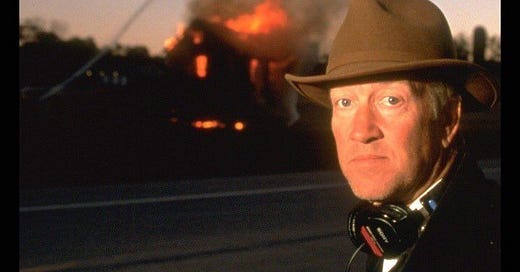


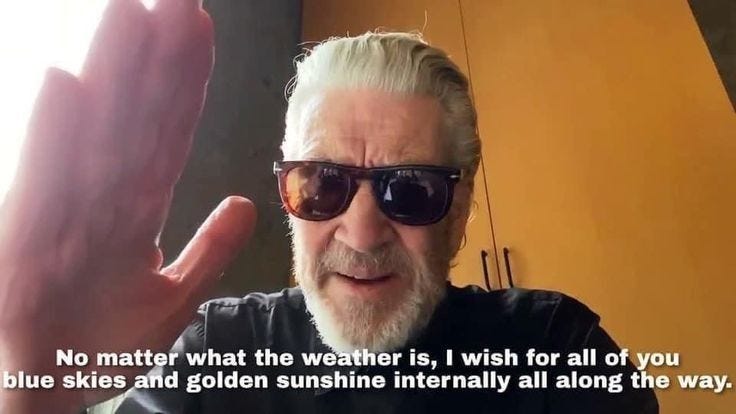
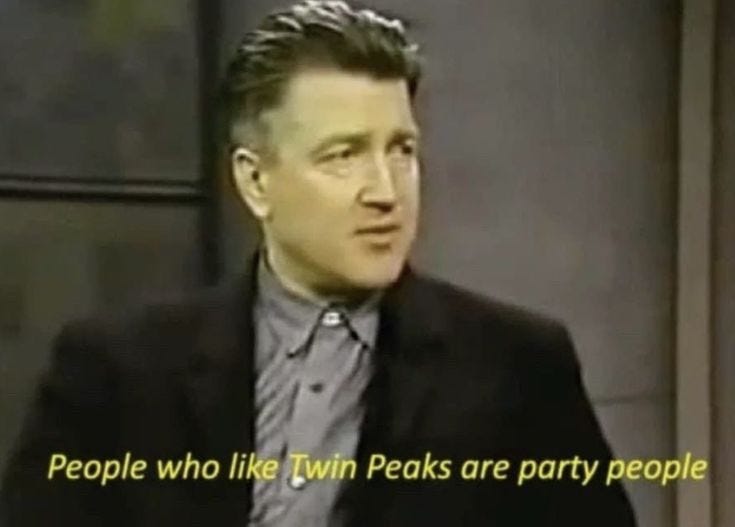
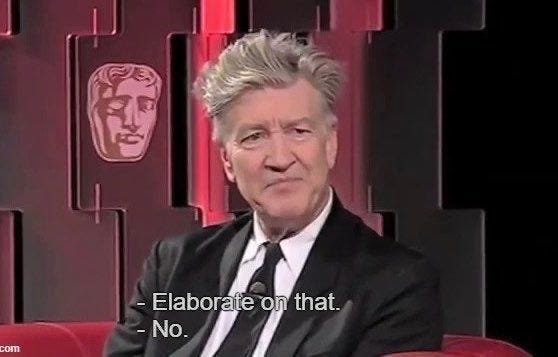
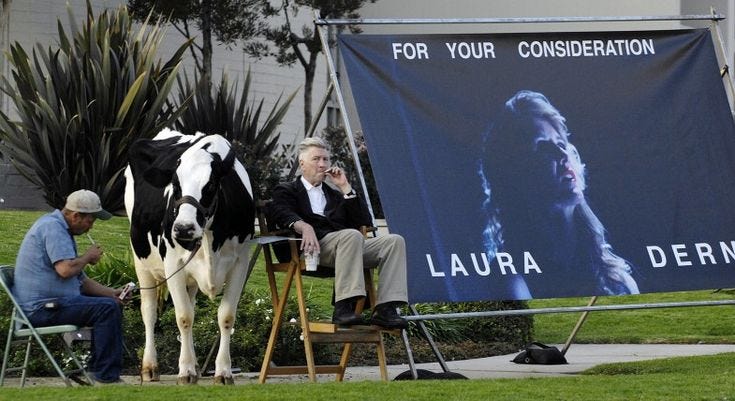
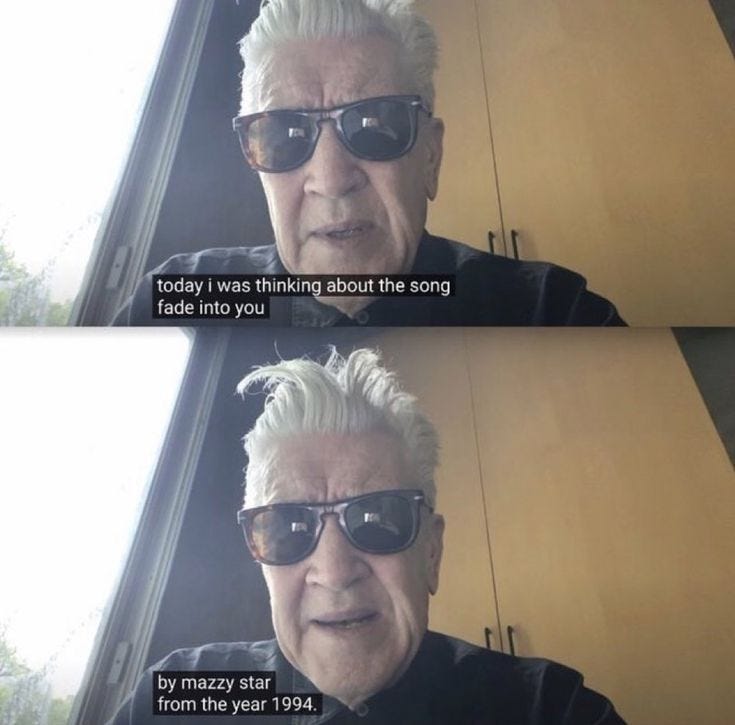
Loved this. Will miss him and what he brought to art so much.